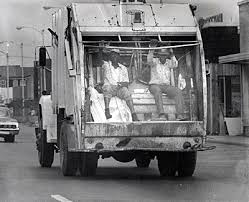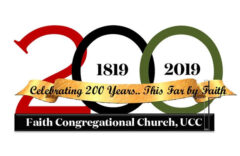
Presented by Patricia Smith
I’m standing here before you this morning because I’m sad about something that I saw on TV last Tuesday night. It bothered me so much that on Wednesday I called Pastor Camp and told him about what I had seen and how I thought that something should be mentioned in church on Sunday. He too had seen the show and he agreed with me.
On Tuesday night I was watching The Last Word with Lawrence O’Donnell (It’s a late night news show). The host said that Martin Luther King was going to get the last word that night. The “last word” is supposedly the most important part of the show and that night it really was.
That show was about the Sanitation Worker’s Strike that took place in Memphis, Tennessee back in 1968. I remember when that incident happened so I watched it and as I watched it, I wept and I couldn’t get to sleep that night. My heart was broken and I was ashamed of myself because I hadn’t known the REAL reason for the strike and had never even bothered to look into it. Granted, I was still in school when it happened but I’m not there now. This is a part of our history!! I should have been interested, inquisitive or even just plain curious but I hadn’t been. BUT NOW I AM.
For the 1,100 sanitation workers, who were all male and exclusively African American, the working conditions were atrocious. They worked rain or shine for 10, 12, 14 hours a day but were only paid for 8 hours at about $1.27 an hour. According to the Miami Herald.com, there was no curbside pickup. The workers had to suffer the indignities of going through other people’s backyards picking up their garbage, collecting fallen tree limbs, dead cats, chicken bones and the like. Since there were no garbage cans, these downtrodden men carried metal tubs full of rubbish and rotten food on their heads and these tubs were often rusted through and the garbage leaked on them. The workers often got maggots in their hair and down the collars of their shirts.
Blacks tolerated these injustices for fear of losing their jobs until February 1 1968, the catalyst, the “straw that broke the camel’s back” happened. Two sanitation workers, Echol Cole aged 36 and Robert Walker aged 30 tragically lost their lives. They were a part of a four man crew that used a dilapidated old garbage truck that they had complained about for years. It was a rainy day so Cole and Walker wore rain coats. Two of the four men sat in the cab of the truck which left Cole and Walker with the choice of hanging on to the poles on the side of the truck or sitting in the back where the hydraulic packing arm crushed the garbage against the rear of the truck. Because of the driving rain, they chose the latter and then the unthinkable happened. The trash compacter, which had been retrofitted with a makeshift motor, was accidently triggered. The first man was pulled in the compactor and ground up with the trash and second man’s raincoat was caught on the truck and he could not escape so he too was ground up. The deaths of these men and plus many other indignities that they were forced to endure are what caused Martin Luther King to be invited to speak in Memphis.
The next day after the accident, the headline in the Memphis paper proudly touted the fact that Elvis Pressley’s daughter Lisa Marie, had been born. No mention of the two sanitation workers. No mention of how their mangled bodies had to be separated from the ground up garbage. No mention that their widows, one of who was pregnant at the time, were given just $500 towards their husband’s $900 dollar funerals in a pauper’s grave. These facts hadn’t been shared because these men were black. I now know that I have no reason to be ashamed for not knowing these facts but I still have a reason to be sad. The people that forced these men to work under these terrible conditions are the ones who should be ashamed.
I questioned about eleven fellow African Americans to find out if they knew the reason for the Memphis Sanitation Workers strike. Some of them had heard about the strike but not one of them knew about Echol Cole or Robert Walker. Of the people that I asked, one was a retired teacher who knew none of the facts and the other one had been my sociology teacher when I attended community college a few years ago. She knew about the strike and instantly told me that this was the first time that MLK had attended a rally that was about social class and economic rights rather than just civil rights and race issues but even she was not aware of the story about Echol Cole and Robert Walker. Because of what I told her, she said that she’s going to add their story to her curriculum. SMALL STEPS . . .
If you are in a good place in your life, you probably got there on the backs of someone from the past, you probably got there on the backs of people who were treated like animals, you probably got there on the backs of people who fought and died so that you could be treated like the people of GOD that you are and in the case of those sanitation workers, you probably got there on the backs of people that were treated like the garbage that they disposed of … They should always be remembered. Always. I just want you to remember these men, Echol Cole and Robert Walker. Don’t let their deaths be forgotten because you probably got to this place on their backs.
![]()
